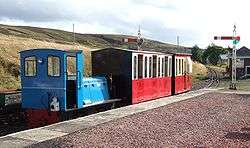Leadhills railway station
Leadhills railway station was opened on 1 October 1901[1] as the intermediate stop on the Leadhills and Wanlockhead Light Railway and served the lead mining area, farms and the village of Leadhills circa 5.5 miles (8.9 km) WSW of Elvanfoot railway station in South Lanarkshire until 2 January 1939 for passengers and freight.[1] Until Wanlockhead station opened Leadhills was the highest standard gauge adhesion station in the United Kingdom.[4]
Leadhills and Wanlockhead Branch | ||||||||||||||||||||||||||||||||||||||||||
|---|---|---|---|---|---|---|---|---|---|---|---|---|---|---|---|---|---|---|---|---|---|---|---|---|---|---|---|---|---|---|---|---|---|---|---|---|---|---|---|---|---|---|
| ||||||||||||||||||||||||||||||||||||||||||
| Leadhills | |
|---|---|
| Location | |
| Place | Scotland |
| Area | South Lanarkshire |
| Grid reference | NS 88619 14460 |
| Operations | |
| Pre-grouping | Caledonian Railway |
| Post-grouping | London Midland and Scottish Railway |
| History | |
| 1 October 1901 | Station opens[1] |
| 31 December 1938[2] | Last passenger train |
| 2 January 1939 | Line officially closed to passengers and goods[1][3] |
| Disused railway stations in the United Kingdom | |
| Closed railway stations in Britain A B C D–F G H–J K–L M–O P–R S T–V W–Z | |
History
Operated by the Caledonian Railway, it became part of the London, Midland and Scottish Railway during the Grouping of 1923. The line had been closed and lifted before the Scottish Region of British Railways came into existence upon nationalisation in 1948.[3] The line suffered greatly from the closure of the lead mines and passenger traffic was slight, although the station was located conveniently near to the small village. Coal traffic had continued to the end.
Infrastructure

To save on costs the passenger stations at Leadhills and Wanlockhead had only slightly raised platforms and therefore passenger carriages had three levels of step board fitted which folded down to enable passengers to board and depart.
This platform at Leadhills was demarcated by a wooden fence and a passing loop of 100 yards length with catch points was provided as was a three ton capacity crane.[5] A siding served a loading bank and another the goods shed.[5] The waiting room, stationmaster's office, ticket office and men's toilet were located in a wooden lean-to building built along the long side of the goods shed.[6] No signals were present, however a telephone was provided.[6]Ireland and the points were worked by ground frames in the absence of a signal box.
The engine shed and water tower stood to the east, 5 miles and 37.1 chains from Elvanfoot.[7]
The site today
The track had already been lifted by April 1939 and the buildings demolished.[2] The Leadhills and Wanlockhead Railway narrow gauge line and station have been constructed on the site of the old station and its trackbed.[4]
| Preceding station | Historical railways | Following station | ||
|---|---|---|---|---|
| Elvanfoot | Caledonian Railway Leadhills and Wanlockhead Branch |
Wanlockhead | ||
References
Notes
- Butt 1995, p. 140.
- Ireland, Page 54
- Wignal (1983), Page 36
- Wham, Page 183
- Ireland, Page 31
- Ireland, Page 32
- Ireland, Page 29
Sources
- Butt, R. V. J. (1995). The Directory of Railway Stations: details every public and private passenger station, halt, platform and stopping place, past and present (1st ed.). Sparkford: Patrick Stephens Ltd. ISBN 978-1-85260-508-7. OCLC 60251199.
- Ireland, Alastair (2011). The Leadhills and Wanlockhead Railway. Kelso : Alastair Ireland ISBN 0-9516271-1-2.
- Thomas, J. (1971). Scotland: the lowlands and borders. A regional history of the railways V.6. Newton Abbot.
- Wham, Alasdair (2017). Exploring Dumfries & Galloway's Lost Railway Heritage. A Walker's Guide. Catrine : Oakwood Press ISBN 9780853610830.
- Wignall, C.J. (1983). Complete British Railways Maps and Gazetteer From 1830-1981. Oxford : Oxford Publishing Co. ISBN 0-86093-162-5.
External links
| Wikimedia Commons has media related to Leadhills railway station. |